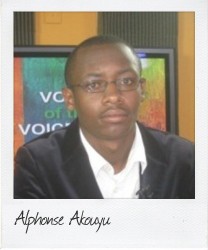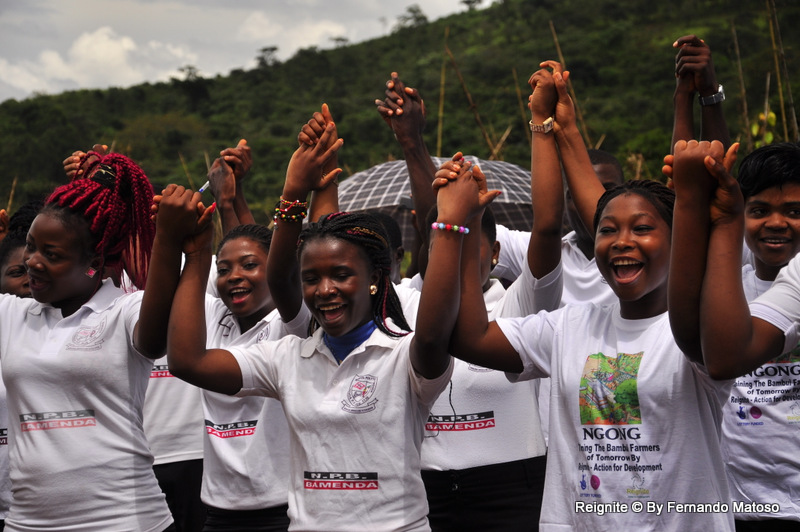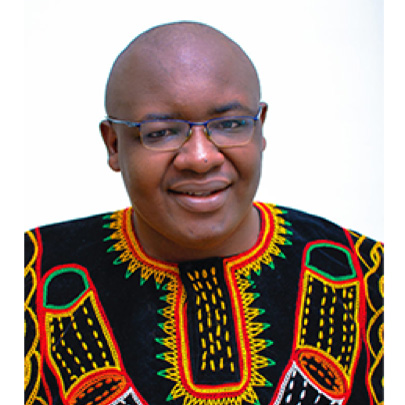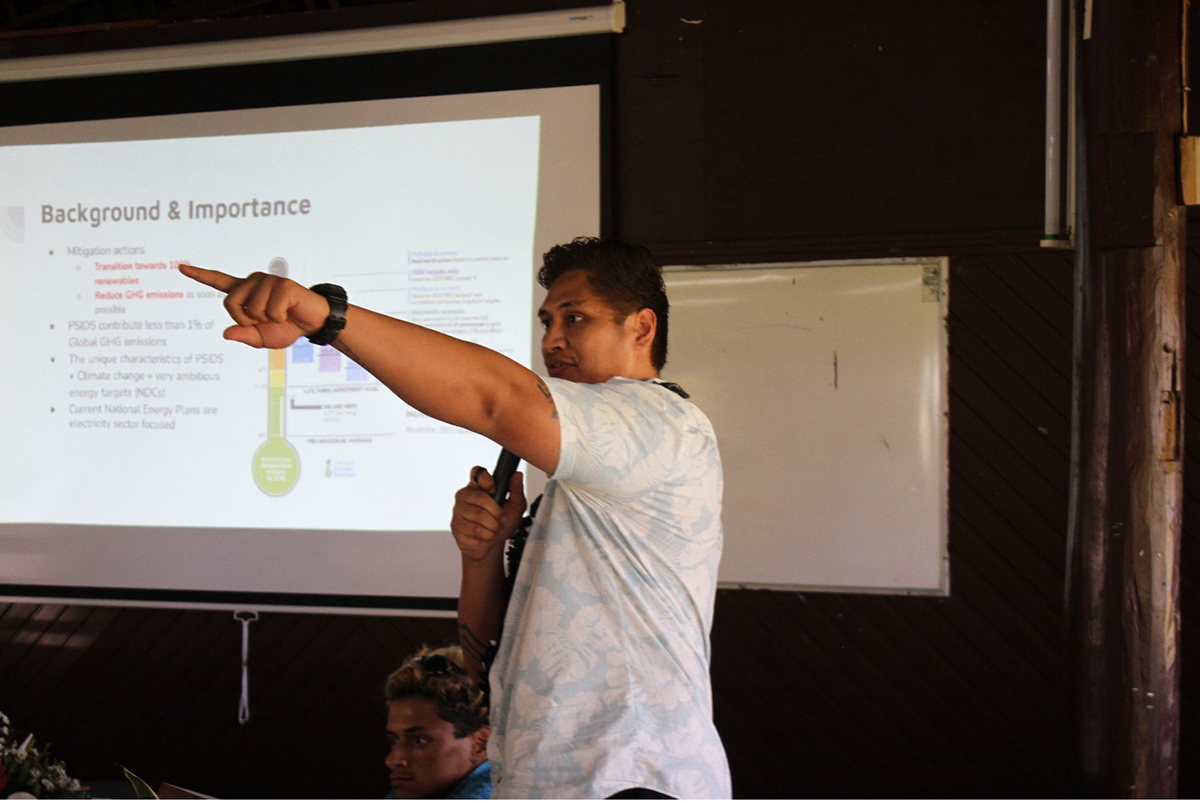“Women’s Day – views from Cameroon”
March 7 This year’s International Women’s Day in Cameroon focuses on “Gender Equality by 2030”, writes Alphonse Akouyu, 21, a Commonwealth Correspondent from Cameroon, who spoke with journalist and coach Ayuk Besong Anne Chantal and Tchatcheut Yonga Nelly Shella, coordinator at the Buea Rural Women Development Centre, to discuss the situation for Cameroon’s women.
This year’s International Women’s Day in Cameroon focuses on “Gender Equality by 2030”, writes Alphonse Akouyu, 21, a Commonwealth Correspondent from Cameroon, who spoke with journalist and coach Ayuk Besong Anne Chantal and Tchatcheut Yonga Nelly Shella, coordinator at the Buea Rural Women Development Centre, to discuss the situation for Cameroon’s women.
Could you give a brief overview of the Cameroonian woman and girl child?
Anne: That is a complex question. Women are different depending on the socio-economic and cultural systems they find themselves in. I believe the Cameroonian woman, like women everywhere, is courageous, hardworking, intelligent and strong. The only difference they have from women everywhere else is the lack of opportunities, information, finance and insufficient support from the men folk. However, I think the Cameroonian woman has come a long way and has learned to work around the shortcomings. She has learnt to bring herself up to a certain standard which permits her to have some voice no matter how small in the affairs of her country, and she has the potential to grow even more if given just a little push by her peers, the men and the society as a whole.
Nelly: Like other girls around the world, a typical Cameroonian girl child is one who grows under the influence of predefined cultural and societal norms, which presumably define their essence of living. Growing in a culturally diverse society, habitat of over 250 ethnic groups, the predefined role of the girl child varies according to the ethnic settlement she identifies with. The daily struggles of a typical Cameroonian girl child centre around her battle to emerge within a patriarchy society which more or less expects a lot from her, yet provides very limited opportunities, will voluntarily or involuntarily disregard her contributions, or set her back stage as her future is being decided upon. These challenges nonetheless define the distinctive features and character possessed by the Cameroonian girl child. She is fierce, resilient, talented and intelligent. Her feminine nature, though feeble, echoes strength and potential, constituting a valuable human resource that should be greatly exploited.
What’s your reaction to the theme of the 2016 Women’s Day?
Anne: I think it’s a theme that just speaks of the wishes of all the women in the world. I hope that this year, the theme of the women’s day will echo and join the voices of gender experts who are calling for not just gender equality, but equity. It is coming at the time when the world is adding its voice to that of women folk, as can be seen in the setting up of an entire SDG just for women.
Nelly: This year’s theme pledge for parity is a call for gender equality, a 50/50 access to all the planet’s resources without reservation. For a young girl in Cameroon, this pledge for parity is an opportunity to rule out all stereotypes, redefine their status and position in the society, as well as claim their entitlement (birth right). It further signifies one more day at school as they gain access to reproductive health services, are protected from forced marriages, sexual and physical assault. It also means enforcing their rights to effectively participate, hold positions of leadership and obtain the same treatment as their male counterparts at all levels.
What can the government and individual woman do to improve the state of affairs for Cameroonian women?
Anne: Two words to answer this question – trust and confidence. The government should trust women. When you trust someone, you give them all the chances to be exceptional. Confidence, in that the women should trust themselves and stakeholders should trust in the ability of the Cameroonian woman to become a change agent in society. If women have confidence in themselves, they would form a formidable army and when combined with the men gives a perfect blend for a better work.
Nelly: I think the government should be more sensitive to the needs of young girls in the enactment of laws and policies. Develop and implement inclusive youth programs which encourage collaboration between young girls and boys at the same scale. Consider equal inclusion of women into leadership positions to promote role modeling for young girls. Revise laws which expose young girls to abuse. Consider suitable approaches to highlight the risk and effects of certain socio-cultural norms on the girl child and engage processes to abolish these norms. We also need a gender-friendly environment to foster effective gender participation.
For the young girls, they consider prioritizing education, seek for coaching and mentorship, aspire and dream big. They should also take up challenges and fight for what you are entitled to. Self belief rolls out all insecurities. Dare to shine and the society will find no reason to place you on the reserve bench. Don’t let your fears overrule your sense of judgment and prevent you from shining. Embrace those fears and never settle for less. Strive at all times to be a better version of yourself, because you are powerful and all you need is to believe in yourself.
Photo credit: Fernando Vidal, Reignite Action for Development
…………………………………………………………………………………………………
About me:
Hello everyone this is your friend Akouyu Alphonse from Bamenda located in the North West Region of Cameroon. I graduated from the Catholic University of Cameroon Bamenda after studying Banking and Finance. I hope to become a Business/International Relations expert.
My areas of interest are serving as Journalist especially on Sports (football) and societal issues aimed at inspiring people to believe in themselves and volunteerism.
…………………………………………………………………………………………………
Opinions expressed in this article are those of the author and do not necessarily represent the views of the Commonwealth Youth Programme. Articles are published in a spirit of dialogue, respect and understanding. If you disagree, why not submit a response?
To learn more about becoming a Commonwealth Correspondent please visit:
http://www.yourcommonwealth.org/submit-articles/commonwealthcorrespondents/
…………………………………………………………………………………………………






